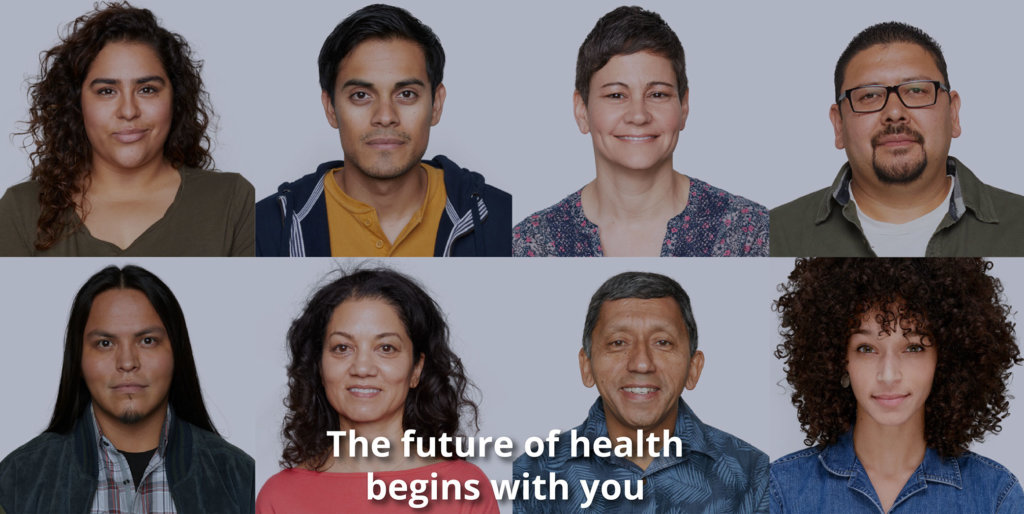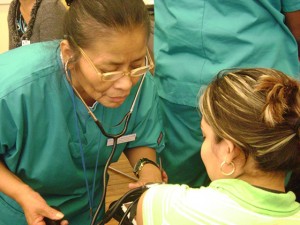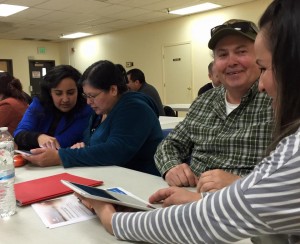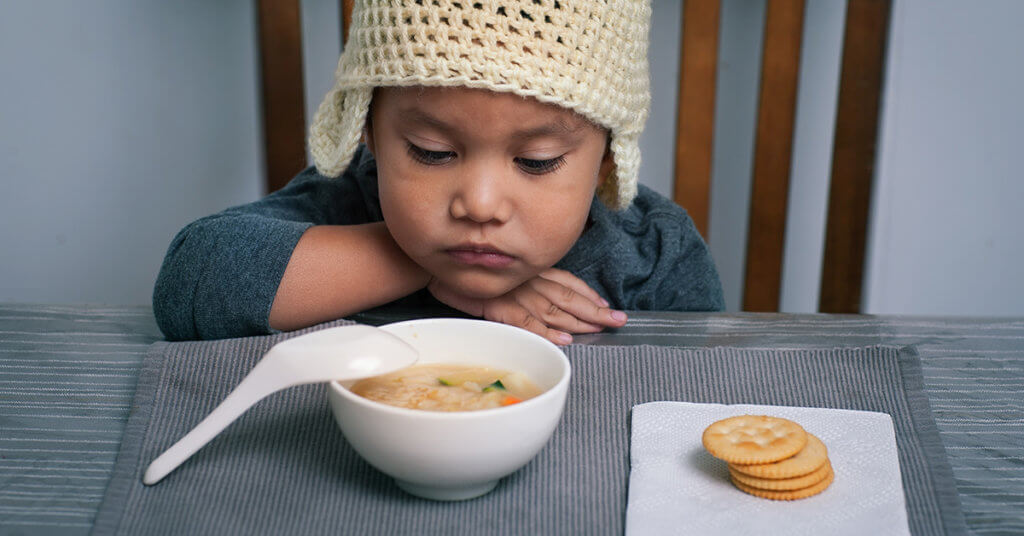Health for All of Us: The importance of Latino participation in clinical trials and research

By Stephanie Presch, Content Specialist, UnidosUS
All of Us is a research program created by the National Institutes of Health (NIH) that aims to enroll volunteers of diverse backgrounds into the study in order to better understand how disease develops, and how we might be able to treat it in the future.
Keep up with the latest from UnidosUS
Sign up for the weekly UnidosUS Action Network newsletter delivered every Thursday.
Jason Resendez, Chief of Staff at Us Against Alzheimer’s, explains that programs like All of Us are particularly important for the Latino community as they have been historically underrepresented in clinical trials.
For example, while Latinos make up 17% of the U.S. population, they make up less than 1% of participants in NIH-funded research. Overall, Latinos make up between 6-7% of participants in clinical trials. This is problematic, as there are real differences in how people of diverse backgrounds respond to different diseases.
WHY ALZHEIMER’S RESEARCH NEEDS MORE DIVERSE CLINICAL TRIALS
Resendez uses the example of Alzheimer’s—Latinos on average present symptoms of Alzheimer’s approximately seven years earlier than other racial and ethnic groups. Additionally, because Latinos tend to live longer, Latinos who have Alzheimer’s tend to live longer with the disease.
“We want to find out why Latinos are at a higher risk, we want to find out why they’re presenting symptoms seven years earlier,” Resendez says. But so far, knowing exactly why this is the case has remained elusive.
Demystifying #Alzheimers research at @KUALZ w/ Latino-serving community partners #MemoryStringsKC pic.twitter.com/BOmOp6VZWI
— Jason Resendez (@jason_r_DC) August 8, 2017
When asked why Latino participation in clinical trials has been low, Resendez names a number of factors. For example, misdiagnosis and underdiagnosis are common.
Resendez recalls the story of Daisy Duarte, whose mother had been told that she had Creutzfeldt-Jakob Disease (CJD), a rare, degenerative, and fatal brain condition. It wasn’t until after Daisy had spoken with a doctor who was a specialist in the disease that she was able to learn that her mother had been misdiagnosed.
“She was forced to close down [her business], because she thought her mother had less than six months to live,” Resendez says.
There are eight million family caregivers in the Latino community, (with two million caring for family members with Alzheimer’s alone), and most of these family caregivers are Latinas in their 40s.
But Alzheimer’s doesn’t just affect families. By 2060, Alzheimer’s will cost the Latino community $2.3 trillion. As the U.S. population is aging overall, more Latinos will be susceptible to Alzheimer’s—making their involvement in clinical trials increasingly urgent.
BARRIERS TO GOOD RESEARCH
The FDA provides snapshots of the demographics of people who participated in studies that led to the approval of different drugs. A quick look at the website will reveal that many drugs were tested on predominantly White populations—and there is no option to locate data on Latino participants.
“You can’t say that you’re doing good science if your sample is 98% Caucasian. That’s not representative of the population these drugs are going to operate in,” Resendez adds.
The All of Us Research Program is an important step toward ensuring that clinical trials that work for all Americans. The program, which is based on precision medicine, takes into account a person’s lifestyle, environment, and family medical history.
All of Us—which is being led by the NIH, aims to create the largest health database ever, by enrolling one million or more volunteers from all across America.
Getting the right information is not just essential for better understanding people’s health, but it’s also about getting information that will help researchers better understand health and disease.
While there is a perception that it’s too expensive to engage communities of color in clinical trial research, lack of participation often comes down to more mundane factors. For example, some trials will compensate you, and some will offer child care, but not all of them.
Sometimes, it’s difficult to access reliable transportation. The time commitment is also a barrier, particularly when you’re being asked to follow up in a trial every six—or every three months.
In other cases, it’s because those who would otherwise qualify have diabetes or hypertension and are excluded from the study. This is also problematic because diabetes, which is prevalent in the Latino community, is a risk factor for Alzheimer’s.
 But often it comes down to knowledge.
But often it comes down to knowledge.
“A lot of Latinos have never heard of a clinical trial or been asked to participate in one,” Resendez explains. In a system where physicians have an average of five minutes per patient, it’s easy to see how it might be difficult to take time to explain the benefits of enrolling in a clinical trial.
The trial process can be complex. To help address the knowledge barrier, Us Against Alzheimer’s works with two UnidosUS Affiliates in the Kansas City area—Guadalupe Centers and El Centro—to connect members of the community with the University of Kansas’s Alzheimer’s Disease Center. Together, they are part of the Kansas City Memory Strings Alliance.
Through the Alliance’s work, they have been able to organize opportunities for community members to learn about what Alzheimer’s research looks like and have their misconceptions challenged. Already since last year, enrollment has grown by 700%.
HOW COMMUNITY-BASED ORGANIZATIONS CAN HELP
Resendez explains that grants for community-based organizations exist that help include them in efforts to reduce disparities in care and improve quality of life for our communities. He gave the example of the Upward Bound grants that help close gaps in higher education. The value of including community-based organizations is that they know the people who the grants are meant to reach well because they’re members of their community.
Demystifying #Alzheimers research at @KUALZ w/ Latino-serving community partners #MemoryStringsKC pic.twitter.com/BOmOp6VZWI
— Jason Resendez (@jason_r_DC) August 8, 2017
Currently, these types of grants don’t exist to help enroll people in clinical trials, let alone help community members become ambassadors to educate the community. Typically, grants go to academic research institutions, who predominantly use the money to buy new equipment and hire new researchers, not focus on targeted enrollment to help expand involvement in clinical trials.
 Resendez suggests that while programs like All of Us are an excellent start, investing in community-based organizations could be an excellent way to expand this work.
Resendez suggests that while programs like All of Us are an excellent start, investing in community-based organizations could be an excellent way to expand this work.
“They need to be engaged in this process from beginning to end,” Resendez says, adding that with training, community-based organizations could explain the importance of clinical trials to members of their community and encourage them to enroll.
Resendez cites the UnidosUS Affiliate Network as an excellent opportunity for community-based organizations to share information with each other, obtain leadership buy-in and support, and become key ambassadors in a rapidly changing world that is innovating preventive and treatment options and cures. And Daisy’s story is an example of why sharing stories and participating in clinical trials are so important.
“You’re giving back to your community,” Resendez says. “This is a way for you to advance not only your own health, but the health of your community.”
MORE FROM OUR AFFILIATES
How community-based organizations can use the power of partnerships to empower their neighborhoods


